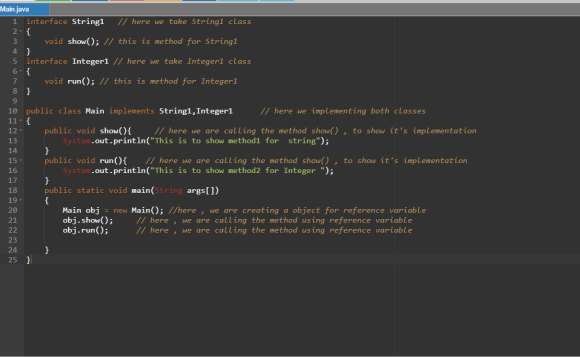Question
In: Computer Science
You coded the following class: public class N extends String, Integer { } When you compile,...
- You coded the following class:
public class N extends String, Integer
{
}
When you compile, you get the following message:
N.java:1: ‘{‘ expected
public class N extends String, Integer
^
1 error
Explain what the problem is and how to fix it.
Solutions
Expert Solution
- Explanation :-
- The Error in the above code is, we can't extend multiple classes at the same time
- That's why we get the Error
- But, we can use implements for extending multiple classes at the same time
- we can use interface and implements for this
- String is a predefined class and Integer is a predefined keyword, so we can't use them as a Classes
- as I mentioned string is a class, but you get a doubt why we can't use the class in a class because already we used that String class in main method
- That's why I changed the class Names
- Here, I used Main as the main class, don't confuse there... you can name it as you want
- the name of the file is Main.java
- CODE:-
interface String1 // here we take String1 class
{
void show(); // this is method for String1
}
interface Integer1 // here we take Integer1 class
{
void run(); // this is method for Integer1
}
public class Main implements String1,Integer1 // here we
implementing both classes
{
public void show(){ // here we are calling the method show() , to
show it's implementation
System.out.println("This is to show method1 for string");
}
public void run(){ // here we are calling the method show() , to
show it's implementation
System.out.println("This is to show method2 for Integer ");
}
public static void main(String args[])
{
Main obj = new Main(); //here , we are creating a object for
reference variable
obj.show(); // here , we are calling the method using reference
variable
obj.run(); // here , we are calling the method using reference
variable
}
}
- CODE:-


Thank You...!
Related Solutions
public class Main{ public static void main (String[] args) { Map<Integer, String> ssnMap = new HashMap<Integer,...
this won't compile package com.test; public class CatalogItem { private String title; private double price; public...
public class Mammal extends SeaCreature { public void method1() { System.out.println("warm-blooded"); } } public class SeaCreature...
write the following programs: Ram.java, Truck.java, LandVehicle.java and Vehicle.java. public class Ram extends Truck { public...
public class Book{ public String title; public String author; public int year; ...
Polymorphism and Inheritance Shape.h class Shape { string color; bool filled; public: &n
Consider the following code: public class Bay extends Lake { public void method1() { System.out.println("Bay 1");...
Consider the following classes: public class Clock extends Bear { public void method3() { System.out.println("Clock 3");...
java programing Q: Given the following class: public class Student { private String firstName; private String...
Assume you have created the following data definition class: public class Book { private String title;...
- Project 7-6: Sales Tax Calculator Create a program that uses a separate module to calculate sales...
- On June 30, Sharper Corporation’s stockholders' equity section of its balance sheet appears as follows before...
- In this journal you are asked to take the role of a mayor or congressional representative...
- Answer correctly the below 25 multiple questions on Software Development Security. Please I will appreciate the...
- 1. The activation energy of a certain reaction is 41.5kJ/mol . At 20 ?C , the...
- Give TWO pieces of evidence that you've successfully made methyl salicylate. Remember when you cite TLC...
- Describe briefly the evolution of Craniata and Vertebrata.
 venereology answered 1 year ago
venereology answered 1 year ago